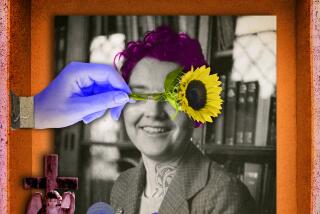Book review: ‘Smothered in Hugs’ by Dennis Cooper
Smothered in Hugs
Essays, Interviews, Feedback, and Obituaries
Dennis Cooper
HarperPerennial: 378 pp., $14.99 paper
Critics are shaky cartographers, experimental scientists, evangelical missionaries and psychoanalysts of the artistic id. We forge a map of our tastes — roads in the cultural landscape and through our own dark aesthetic woods. We make leaps of faith, hypothesizing an artist’s meaning in a remarkably limited context. We swagger up to the craps table and play with the thrill of risk flushing our faces. Occasionally, we are blessed with a work that’s undeniably a classic; bless that rare visitation from the heavens above.
In his essay on Quentin Tarantino, originally published in 1995 in Artforum magazine, literary provocateur Dennis Cooper analyzes the work of “the quirkily brilliant minor director” with a hustler’s eye. His reading of Tarantino, then the grinning poster boy for independent film a year after the release of his still-most beloved work, “ Pulp Fiction,” is an icily acute dissection of strengths and failings. Cooper delivers with the unswerving faith of someone who lives and dies by his gut reactions but also with the methodical intelligence of someone who parses those reactions so he can articulate them to the sharpest degree.
In one of the essay’s typically heated sentences, Cooper writes: “Tarantino does one thing with absolute brilliance: he boxes talky, neurotic, bright but half-articulate, schlumpy characters into parallel orbits around an agreeable, slightly flammable, usually trendy topic.... The conversations he constructs are so superficially systematic that when one character grows frightened of a commitment to the interchange, separates, and unleashes some private insanity on his or her companion, the effect is nightmarish.”
He goes on to uproot what he sees as Tarantino’s failings — a lazy visual sense, a lack of true transgressive resonance in his characters — in one of the best essays in “Smothered in Hugs: Essays, Interviews, Feedback, and Obituaries,” a title cribbed from one of Cooper’s favorite bands, Guided by Voices.
Wimpy transgression is a damning critique coming from a writer who habitually communes with what’s typically considered the perverse. All sorts of NEA-jeopardizing wickedness pervades his work, such as in the interconnected George Miles novels or his recent stage production featuring violent, sexualized puppets based on his 1993 novella, “Jerk.”
For a guy permanently fixed on the edge, “Smothered in Hugs” has the sweetness of a time capsule buried in a schoolyard. Nearly all the work is from the 1990s, some of it already excerpted in his 1999 collection, “All Ears.” Furthermore, only the last quarter or so of “Smothered” was written in the new millennium, with the last work originally published in 2004. Nostalgic, now-impossible media moments emerge: In the halcyon days of 1990, a writer could sit with pretty-boy weirdo Keanu Reeves and ask him, “Are you gay or what?” and get the answer “no … but ya never know” without a publicist stepping out from a dark alley with a crowbar.
Cooper’s likes and dislikes are on display, rendered with dogged passion or swift, condemning vigor. For the most part, he favors artists working on the radical fringes in overt but intellectual ways — gay rocker Bob Mould of Hüsker Dü, druggy brogue-writer Irvine Welsh, the visionary filmmaker Robert Bresson, whose work he credits with constructing his literary sensibility — but it’s not always the accepted icons. He shoots a poison dart at William S. Burroughs, who, Cooper writes, is “so ubiquitous, he’s practically the Beat Generation’s Angelyne.”
Sometimes, these sneak attacks delightfully surprise — Cooper has a knack for zingy one-liners — and at other times, they read like peckish dashes of partisanship. At the end of his postmortem on River Phoenix, he separates the “marginalized wackos with integrity… Crispin Glover and John Lurie” from the “hipster sellouts, like Christian Slater and Robert Downey, Jr.” He could’ve made his point without naming names, though the bravado is appealing.
It’s refreshing when someone who knows his own artistic predilections as well as Cooper details a change of opinion, like in his essay on avant-garde filmmaker Derek Jarman. In fact, his conversion is so wholehearted that were he to have the same experience with Downey Jr., for instance, he’d probably be more than happy to write the story of his about-face. Cooper seems to enjoy few psycho-artistic moments more than capturing exactly how and when an artist affected another; the specific machinations of frisson, the sudden fever of a message received.
That generosity is also on display in “Too Cool for School,” though in a different way. The essay written for Spin in 1994 — an assignment that would never see the light of day today — follows a group of students in UCLA’s highly regarded fine arts program at that anxious time when some have been picked up by hotshot galleries and others are nervously contemplating Plan B. Cooper seems to be rooting for them all, simply because he’s a sucker for young artists, though, in a rare turn, it’s unclear whose work he likes best. His advocacy is gentle, flowing just underneath the text, and it ends on a note of rock ‘n’ roll delicacy. “Tonight they’re just interchangeable pieces of a wacky extravaganza,” Cooper writes, recalling a particularly raucous costume party thrown by the fledgling artists. For that moment, their imminent success or failure “is no big deal necessarily.”
Wappler writes about music for The Times.
More to Read
The biggest entertainment stories
Get our big stories about Hollywood, film, television, music, arts, culture and more right in your inbox as soon as they publish.
You may occasionally receive promotional content from the Los Angeles Times.










